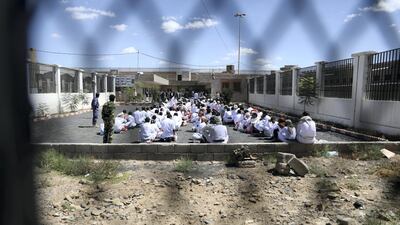Religious minorities and journalists held in Houthi jails in Yemen were banished to solitary confinement for asking for more food, a report reveals.
Graphic details of the ill treatment emerged during interviews with 12 political opponents, journalists and members of Yemen's Bahai religious minority released last year as part of a prisoner exchange deal.
All developed chronic health problems as a result of their treatment by the Iran-backed rebels.
The study by Amnesty International revealed a pattern of arbitrary arrest, brutal treatment behind bars, unfair trials and permanent exile for critics.
Those interviewed told of jailers beating them with implements including steel rods and electric cables. Prisoners were subjected to mock executions, hosed with water and spent months in solitary confinement.
Former prisoners recounted how interrogators threatened to shoot them and kill members of their families outside the jail if they failed to give names of people critical of the Houthis.
More than 1,000 Houthi-held prisoners were released in October as part of the deal with the internationally recognised Yemeni government.
Most of the people released were fighters, but about 20 civilians had also been detained and tortured for up to seven years.
Some were never formally accused of any crime but others stood trial on trumped-up charges of spying, which carry a mandatory death sentence.
Their prosecutions included evidence secured under torture, the report said.
“Security forces knocked at the door … they promised that it would not take more than two hours, after which they would return me home. But the two hours turned into three years," one critic said.
Prisoners were held in overcrowded cells and did not receive sufficient medical care, clean water or food.
“Some were subjected to solitary confinement for 20 days solely for requesting more food from the authorities and going on hunger strike,” the report said.
When they were released, the Bahai prisoners were forced into exile on flights to Ethiopia and none have been able to return home to be reunited with their families.
One of the Bahais said he begged authorities to allow him to visit his 80-year-old father, but he was instead taken to the airport and flown out of the country.
“This report highlights how prisoners have been used as political pawns with forcible exile and displacement resulting from negotiated prisoner deals by Houthi de facto authorities,” said Heba Morayef, Middle East and North Africa regional director at Amnesty International.
“No one should be forced to choose between staying in unlawful detention or abandoning their home or country.”
The released prisoners did not include at least 35 people known to have been seized arbitrarily by the Houthis, the charity said.
They include a Briton, Luke Symons, who was detained in April 2017 in Sanaa. He was accused of spying for the UK but has never been put on trial.
His family believe he was detained only because security forces discovered he had a British passport.
The failure to include people such as Mr Symons in the prisoner exchange creates “the risk that future releases of those arbitrarily detained may only be carried out within the limited context of political negotiations”, Amnesty International said.
The Houthis control much of Yemen, including Sanaa, after a military offensive drove out President Abdrabu Mansur Hadi in 2015.
The 1,056 prisoners were released as part of a deal struck in Switzerland during ceasefire talks.


